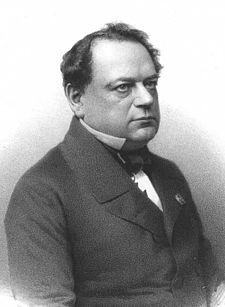- Moritz von Jacobi
-
Moritz Hermann von Jacobi 
Moritz Hermann von JacobiBorn September 9, 1801
Potsdam, Kingdom of PrussiaDied March 10, 1874 (aged 72)
Saint Petersburg, Russian EmpireResidence Prussia, Russian Empire Nationality German Fields Physics, Engineering Institutions Russian Academy of Sciences Known for Maximum power theorem Moritz Hermann (Boris Semyonovich) von Jacobi (Russian: Борис Семёнович (Морис-Герман) Якоби) (September 21, 1801 – March 10, 1874) was a Jewish German engineer and physicist born in Potsdam. Jacobi worked mainly in Russia. He furthered progress in galvanoplastics, electric motors, and wire telegraphy.
Contents
Motors
In 1834 he began to study magnetic motors. In 1835 moved to Dorpat (now Tartu, Estonia) to lecture at Dorpat University. He moved to Saint Petersburg in 1837 to research usage of electromagnetic forces for moving machines for Russian Academy of Sciences. He investigated the power of an electromagnet in motors and generators. While studying the transfer of power from a battery to an electric motor, he deduced the maximum power theorem. Jacobi tested motors output by determining the amount of zinc consumed by the battery. With financial assistance of Czar Nicholas, Jacobi constructed in 1839 a 28 foot electric motor boat powered by battery cells. The boat carried 14 passengers on Neva river against the current. The boat fared at the speed of three miles for hour.
Jacobi's Law

Circuit Diagram
Power is being transferred from the source,
with voltage V and resistance RS,
to a load with resistance RL,
resulting in a current I. I is simply
the source voltage divided by the total
circuit resistanceThe law known as the maximum power theorem states:
- "Maximum power is transferred when the internal resistance of the source equals the resistance of the load, when the external resistance can be varied, and the internal resistance is constant."
The transfer of maximum power from a source with a fixed internal resistance to a load, the resistance of the load must be the same as that of the source. This law is of use when driving a load such as an electric motor from a battery. Jacobi obtained his theorem by common sense.
Electrotyping and telegraphy
In 1838, he discovered galvanoplastics, or electrotyping, a method of making printing plates by electroplating. The way in which this works is analogous to a battery acting in reverse. The stereotype was an impression taken from a form of movable lead type and used for printing instead of the original type. This technique is used in relief printing.
He also worked on the development of the electric telegraph. In 1842-1845 he built a telegraph line between Saint Petersburg and Tsarskoe Selo using an underground cable. In 1867 he was a Russian delegate to the Commission on measurement units at the Paris World's Fair. He was a strong proponent of the metric system.
Family
He was a brother of the mathematician Carl Gustav Jacob Jacobi.[1]
Notes
External links
- Katz, Eugenii,. "Moritz Hermann Jacobi". Archived from the original on 2006-10-06. http://web.archive.org/web/20061006050712/http://chem.ch.huji.ac.il/~eugeniik/history/jacobi.html.
- Calvert, J. B., "Jacobi's Theorem Also known as the Maximum Power Transfer Theorem, misunderstanding of it retarded development of dynamos". March 30, 2001
Categories:- 1801 births
- 1874 deaths
- German engineers
- German Jews
- Russian electrical engineers
- German inventors
- Russian inventors
- Demidov Prize laureates
Wikimedia Foundation. 2010.
